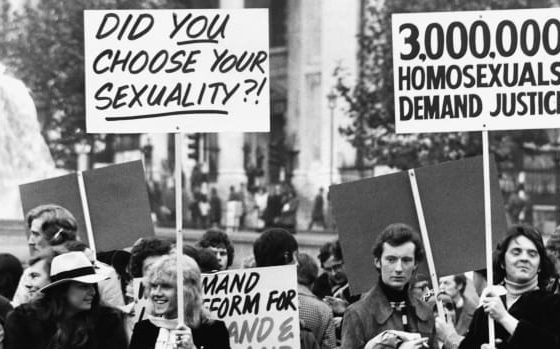Earlier this month, the Supreme Court heard three landmark cases fighting for LGBTQ rights in the workplace.
In all instances, an employee had been fired because of their sexual orientation or gender identity. The decision the Supreme Court makes will impact the lives of many—today, half of all LGBTQ people in the country work in one of the 29 states where a person can be legally fired for their orientation or gender identity.
The ruling isn’t expected to come out until next year, but the cases are made especially relevant being heard against the backdrop of LGBTQ History Month. An observance held throughout October, LGBTQ history month gives the community a space to reflect on, commemorate and celebrate the most important moments and figures of the lesbian, gay, bisexual and transgender rights movements.
“What I’m most appreciative of [this month] is the people in the past who fought the hard fight when it was really difficult to do so. They fought not necessarily because it would make their world a lot better, but because they knew that down the line—life wouldn’t be as hard.” June Churchill, president of DU’s Queer Student Alliance (QSA), said. “[LGBTQ history month] is taking a look at events like that, at queer legacy and queer activism, and trying to take that spirit into my own work.”
Throughout much of history, the rights movement was fragmented and divided between those who were lesbian, gay, and bisexual and those who were transgender. The 1969 Stonewall uprising, an impromptu series of protests held outside a gay bar being subjected to police brutality, is often cited as the spark of a more unified and proactive LGBTQ rights movement in the United States.
“The police are dragging out this one butch lesbian, and she yells to the people, ‘What are you doing there? Why are you standing there? Fight,’” Churchill said, referencing the actions of a woman of color known as Stormé DeLarverie during the protests. “[Stonewall] was really what kicked off the movement. You finally had people coming out in the open and saying, ‘We aren’t afraid to be who we are anymore. And we want to say it loud and proud to society.’”
In the year following Stonewall, the first pride rallies were held across three major cities. In 1978, the first openly gay politician—Harvey Milk—was elected as city commissioner of San Francisco. Television shows like the “Golden Girls” began giving LGBTQ people representation in the media of the early ‘80s. The emergence of openly LGBTQ celebrities like Ellen DeGeneres and Caitlyn Jenner, despite their faults, did enormous work in incorporating the community into the public’s main discourse. Then, in 2015, the Supreme Court legalized gay marriage on a nationwide level.
In the last 20 years, the rights movement has made enormous strides. The general attitude toward LGBTQ people has been completely flipped on its head; once opposed by 70 percent of Americans, the community is now supported by almost those same numbers.
“[LGBTQ history month] is just to acknowledge that this is a history and a community that’s been thriving despite massive opposition for hundreds of years,” Jack Davis, secretary of QSA, said. “It’s important to celebrate that—to go, ‘We’re here, we’re queer, and we’re angry.’”
The fight is far from over, though. The Supreme Court cases on workplace discrimination resonate with this sentiment. Much work has been done, but more is needed to disrupt the status of how the system disadvantages the LGBTQ population. Part of that involves looking at our local communities and individual actions. Remaining aware not only during this month but in how we carry ourselves in our day-to-day is essential.
“Most people are really good allies, it’s just the microaggressions—how do you coach that? How do you teach ‘don’t do that’? It’s a little hard.” Davis said. “The piece of advice I always give is don’t be super defensive when someone goes, ‘Hey, that’s not okay.’ Don’t be super profuse and apologizing—just be a good person. Learn.”
On campus, students can attend QSA meetings on Thursdays in the Pride Lounge and take part in the events they hold year-round. On Nov. 7, they’ll be holding an observation of Trans Day of Remembrance. Next quarter, they’ll be hosting a talk on all-gender restrooms called “Give a Sh!t” on Jan. 9, and students can also come to their “Love is Love” Valentine’s Day Dinner in February.
As LGBTQ history month ends, we’re tasked with asking ourselves how we can continue to apply the sentiment of reflectivity towards both the past and future.
Churchill urges everyone to “do research, get educated and dive into conversations…Because a lot of times, the work of advocacy is left to people in those groups. For some, [queer rights and queer existence] can seem like a novelty or a fun but hypothetical classroom discussion. But, I’m living that every day. So, treat queer narratives and queer people with respect.”











